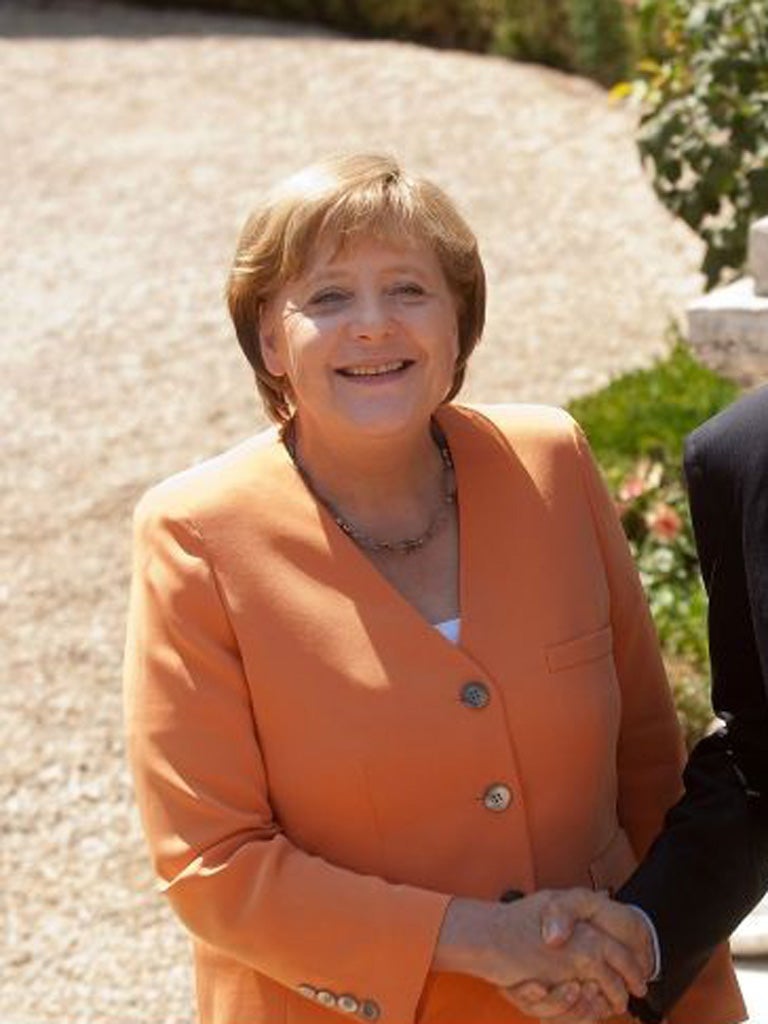Euro might be in crisis – but Merkel's making hay
Chancellor's approval rating jumps despite criticism from eurosceptics

Your support helps us to tell the story
From reproductive rights to climate change to Big Tech, The Independent is on the ground when the story is developing. Whether it's investigating the financials of Elon Musk's pro-Trump PAC or producing our latest documentary, 'The A Word', which shines a light on the American women fighting for reproductive rights, we know how important it is to parse out the facts from the messaging.
At such a critical moment in US history, we need reporters on the ground. Your donation allows us to keep sending journalists to speak to both sides of the story.
The Independent is trusted by Americans across the entire political spectrum. And unlike many other quality news outlets, we choose not to lock Americans out of our reporting and analysis with paywalls. We believe quality journalism should be available to everyone, paid for by those who can afford it.
Your support makes all the difference.Despite angry domestic criticism of her efforts to resolve the euro crisis, Chancellor Angela Merkel's popularity among German voters has reached its highest point since 2009, according to the results of an opinion poll broadcast yesterday by the ARD television channel.
According to the poll, 66 per cent of the electorate were satisfied with the performance of their country's first woman leader, and some 58 per cent said they agreed with the view that Ms Merkel had acted "properly and decisively over the euro crisis".
The poll results showed a significant 8 per cent increase in the Chancellor's popularity over the space of a month, suggesting that her handling of the eurozone crisis played a key role in influencing the electorate's verdict. At the same time, however, voters' fears that the crisis would escalate had never been so great, the poll found.
On her return from last week's eurozone summit, where she was widely perceived as having given in to demands from Italy and Spain to approve bailout funding to be used directly to rescue ailing banks, Ms Merkel was accused by many of her domestic critics of making a policy U-turn.
Yesterday, 170 leading German economists, headed by Hans-Werner Sinn, the eurosceptic head of the Munich-based Ifo economic research institute, stepped up the criticism by publishing an appeal for citizens to rise up and oppose Ms Merkel's plans to rescue the single currency.
The appeal singled out plans for a banking union announced at the Brussels summit and called on Germans to "warn" politicians of the dangers of such a project. "Countries like Germany could be saddled with ever-increasing risks through heavily indebted countries," it argued.
Wolfgang Schäuble, the finance minister, responded to the economists' criticism yesterday by accusing them of confusing the public. "I find this outrageous," he said. He insisted that the banking union was not intended as a measure to pool European debt, but rather as a means of creating joint supervision of European banking. In what threatened become a "battle of the economists", seven other leading financial experts announced their support yesterday for Ms Merkel's euro policies, in a joint statement headlined: "No horror scenarios". They accused Mr Sinn's economists of failing to support their arguments with facts.
Despite Ms Merkel's renewed popularity, yesterday's poll result suggested that her ruling coalition of conservative Christian Democrats and liberal Free Democrats would lose next year's general election, meaning that to stay in power Ms Merkel would have to form a second grand coalition with the opposition Social Democrats.
Join our commenting forum
Join thought-provoking conversations, follow other Independent readers and see their replies
Comments